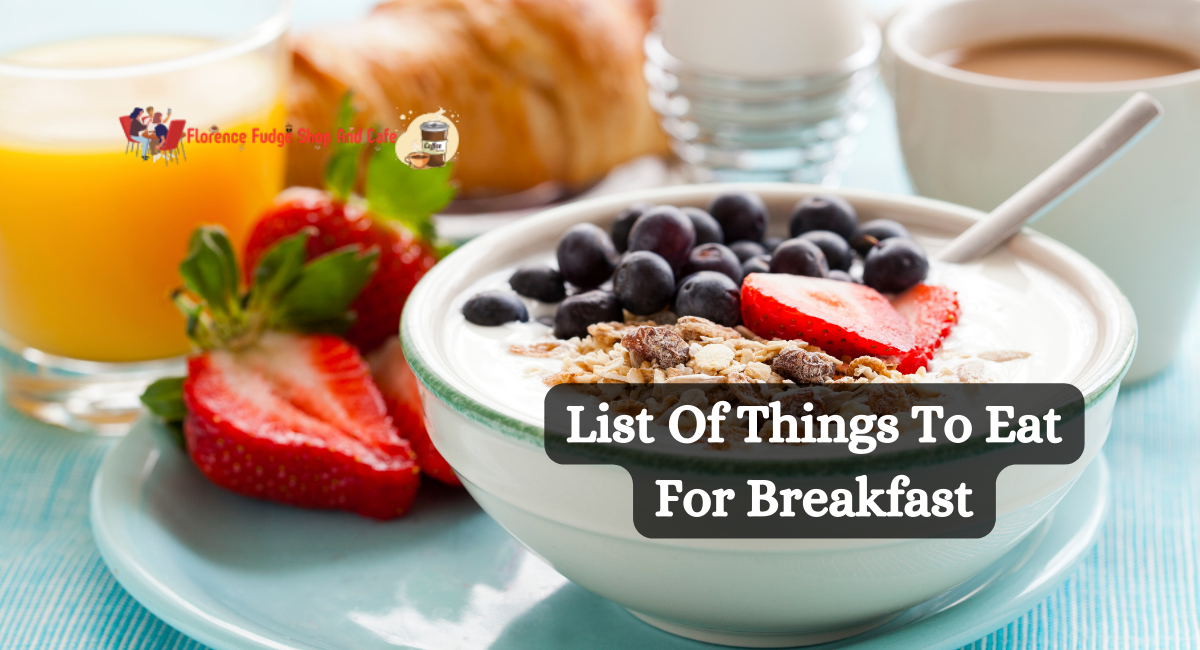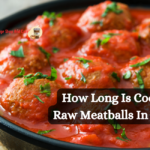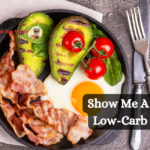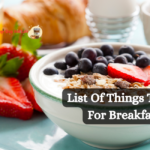Breakfast may be the most essential meal of the day and one of our preferences, but it’s also one of the most difficult! Even before our morning coffee, we must come up with breakfast ideas, which can feel like a lofty order. If you are in the same situation, have no fear! To assist you—and honestly, to help ourselves as well—we’ve compiled 10 brunch recipes! From incredibly healthy breakfast ideas to low-carb, fancy-enough-for-Christmas breakfasts to simple, easy breakfast ideas, we have you covered! Let’s plunge in! So, here is your list of things to eat for breakfast.
List Of Things To Eat For Breakfast
Breakfast typically consists of protein, fiber, and a variety of nutrients. Eggs, whole wheat toast with garnishes, nuts, and green tea are straightforward options for a nutritious morning meal.
1. Eggs
Eggs are a simple and healthy breakfast option.
They provide the protein necessary for muscle development and upkeep. In addition, it can keep you feeling satisfied.
People who ate eggs and toast in the morning felt substantially less hunger than people who ate bran cereal, indicating that the higher protein intake (25 grams versus 11 grams) promoted greater satiety.
The egg group also consumed fewer calories at lunch, showing that eggs promote satiety — the sensation of fullness — which can aid in losing weight.
Also, eggs contain credible Sources:
- The egg yolk contains lutein and zeaxanthin, a pair of antioxidants that appear to promote eye health and may have additional benefits. A Reliable Source for Skin, Liver, Eye, and Heart Health.
- Choline, an essential vitamin source Reliable for Brain and Liver Health
- Folate and B vitamins, including
- Vitamin A
- Essential minerals, including iron, calcium, and others
2. Greek Yogurt
Greek yogurt is an excellent breakfast option.
It is produced by extracting whey and other liquids from milk curds, resulting in a protein-rich, creamier product than conventional yogurt.
Additionally, it contains fewer calories than many other protein sources. A serving of 1 cup (245 grams) of Trusted Source includes 25 grams of protein and 149 calories.
Other nutrients present in Greek yogurt are:
- Calcium
- vitamins B12
- Zinc
- Potassium
- Phosphorus
3. Coffee
Coffee contains caffeine, which increases physical and mental performance, enhances mood, and promotes alertness.
Additionally, it may also contain polyphenols, compounds with antioxidant and anti-inflammatory properties.
According to studies, most individuals can safely consume up to three cups (710 ml) of coffee daily or 400 mg of caffeine.
Caffeine consumption during pregnancy should not exceed 200 mg per day, as it may increase the risk of complications.
Your coffee can be consumed plain or with dairy or plant-based milk. Avoid or use sugar sparingly, as excessive sugar consumption is associated with health risks.
4. Oatmeal
Oatmeal is made from grains that have been rolled or steel-cut. It includes beta-glucan, a soluble fiber that can help reduce cholesterol and glucose levels and has antioxidant and probiotic properties.
Because of how the body processes oats, they will also keep you satisfied, reducing the desire to snack in the middle of the morning.
Additionally, oats provide Source:
- Iron
- Vitamins B
- Manganese
- Magnesium
- Zinc
- Selenium
5. Chia Seeds
Chia seeds are an excellent fiber source.
One ounce (28 grams) of desiccated chia seeds from Reliable Source contains nearly 10 grams of fiber.
This fiber is also soluble, meaning it absorbs water and increases the volume of food traveling through the digestive tract, making you feel fuller—trusted Source for an extended period.
Among other benefits, the nutrients in chia seeds may aid in glucose management, cholesterol reduction, and inflammation prevention.
6. Berries
Berries, such as blackberries, raspberries, strawberries, and blueberries, are tasty and rich in antioxidants.
They provide a delicious snack typically rich in fiber and low in calories.
Berries additionally contain antioxidants that are called anthocyanins, which are responsible for their blue, purple, and scarlet hues. A diet rich in anthocyanins may protect against inflammation, cardiovascular disease, cancer, diabetes, and other chronic illnesses.
For a delicious brunch, combine berries with Greek yogurt, cottage cheese, oatmeal, chia pudding, or a fruit smoothie.
7. Cottage Cheese
Cottage cheese is a high-protein breakfast option, with 24 g of protein per cup (220 grams). Consequently, it is also satisfying. According to a 2015 study, cottage cheese is as gratifying as eggs.
Cottage cheese is minimal in calories, with only 180 calories per cup (220 grams), according to a reliable source. It means that it may promote weight loss without causing hunger.
You can eat cottage cheese with various nutritious foods, including berries, apricots, tomatoes, cucumbers, chia seeds, flaxseeds, and granola.
8. Whole Grain Toast
Whole grain toast is rich in fiber as well as complicated carbs. These digest slowly, help you feel happy longer and are more unlikely to raise your blood sugar levels than white flour breads and pastries.
Many foods can be paired with whole wheat toast, including:
- Egg and tomato puree
- avocado and hot chili flakes
- banana and unsweetened, natural peanut butter
- strawberry cheese and cottage cheese
- fig slices and honey
- tuna
- turkey or chicken sliced
- baked beans
9. Nuts
All varieties of nuts are provided. Magnesium, potassium, heart-healthy monounsaturated fat, and antioxidants are available from a reliable source.
Their protein, lipid, and fiber content also contributes to their ability to promote satiety and manage weight.
A 2022 analysis reputable source concluded that consuming a handful of nuts and seeds per day can lower the risk of heart attack and other health conditions unless you have a nut allergy.
Nuts are typically high in calories, so consuming too many could result in weight gain. Additionally, it is ideal to use nuts without added salt, sugar, or oil, as these ingredients may be unhealthy.
10. Green Tea
Green tea is a refreshing beverage to consume in the morning. It contains approximately half as much caffeine as coffee.
It also contains L-theanine, a stabilizing agent that may reduce the “jitters” associated with caffeine consumption. It may also increase mood and reduce anxiety to a reliable source.
Lastly, green tea contains epigallocatechin gallate (EGCG), an antioxidant that may protect against neurodegenerative diseases like dementia and cell death.
The breakfast options provide a joyous start to the day. The menu ranges from classics such as eggs and toast to wholesome oatmeal and vibrant fruit beverages. These breakfast options balance flavors, textures, and nutrients to accommodate individual preferences and dietary requirements.
Thank you for reading…..










